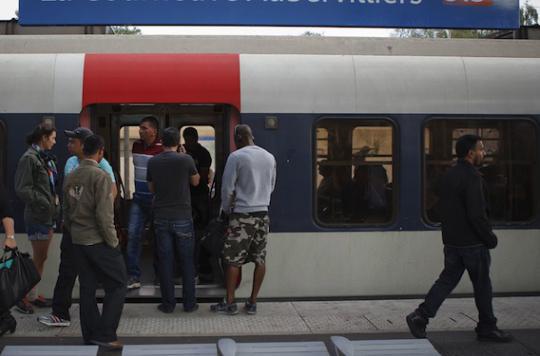The “big mobiles” pass 2 hours a day in a train or a bus to get to their work. In addition to stress and fatigue, these travelers have a higher burnout rate.

Delay of trains, rude travelers, crowded metro trains, in Paris, public transport can sometimes seem like an ordeal. So much so that many Parisians often wonder how they manage to endure this on a daily basis.
In a study conducted at the École Polytechnique Fédérale de Lausanne (EPFL), researchers analyzed the reality of those who drool the most. These pass through for 2 hours a day in a train, bus or car. This “big mobiles” phenomenon has been scrutinized for ten years in four countries, Switzerland, France, Germany and Spain.
15% of 25-54 year olds are “big mobiles”
This work which appears this Monday in the form of a book (1) is based on two studies, carried out in 2007 and 2011, among 7,000 workers aged 25 to 54 years. First observation, the great mobility for professional reasons is far from anecdotal.
Between 11 and 15% of active 25-54 year olds are confronted with it. Germany and Switzerland have the highest rates, growing between 2007 and 2011. “In these countries, high mobility most often corresponds to a choice,” specifies in a Press release, Vincent Kaufmann, director of Urban sociology laboratory (LASUR) from EPFL. It is facilitated by the fact that the very efficient transport system favors long journeys, ”he adds.
A way out of unemployment
Conversely, in Spain and France, long commuting times are more endured and sometimes are the only way out of unemployment. The banking and financial crisis started in 2008 has obviously left its mark. In Spain, in 2011, one in two major mobiles became so to escape unemployment, against 28% in France, 22% in Germany and 13% in Switzerland.
Moreover, these sociologists draw up typologies of major motives which often challenge clichés. Thus, it is generally a springboard in Switzerland and for women in France, but more a sign of precariousness in Spain.
Finally, more often than not, it is not a question of people with high incomes and a high level of education. And ultimately, professional success is not necessarily there. Worse still, at the time of the bill, the social price of high mobility is disastrous.
Conjugal instability, burn-out …
These sociologists summarize it in two expressions: “marital instability” and “lower fertility”. Among the women questioned who have never experienced an episode of great mobility, 10% did not have children at the time of the interview. They are 18% among those having experienced a long mobility, 22% among commuters long-term and 23% among those who experienced high mobility at the start of their career.
In addition to this observation, stress, fatigue and a “burnout rate higher than other employees”, specify the sociologists. “Professional exhaustion also frequently leads to a questioning which leads to the exit from high mobility”, they conclude. We imagine that in this situation, it is more difficult to find a job.
(1) “Great work-related mobility, European perspective”, by Emmanuel Ravalet, Stéphanie Vincent-Geslin, Vincent Kaufmann, Gil Viry, Yann Dubois, Economica editions, October 2015.
.

















